Perhaps second only to tomatoes, cucumbers are one of the most popular vegetables to plant in the home garden. It’s no wonder really. Cucumber plants are prolific fruiters, so if you’re looking to enjoy cucumbers as pickles, sliced in salads and sandwiches, or dehydrated as chips (one of my personal favorites), you’ll have more than enough to work with.
While cucumbers are pretty easy to grow, there are some things you have to watch out for. For instance, cucumbers are prone to pest attacks from cucumber beetles, and fungal diseases like powdery mildew. Occasionally, you’ll also experience the phenomenon of bitter fruit. This can be incredibly frustrating and disappointing since that fruit is largely inedible.
Let’s explore why this can happen and – more importantly – how to prevent it in the first place.
So Why Are My Cucumbers so Bitter?
Bitterness in cucumbers occurs when the natural compound cucurbitacin finds its way into the fruit. Cucurbitacins are normally found in the leaves, stems and roots of cucumber plants, but can migrate to the fruit when the plant is under stress. Excessive heat, uneven watering, and extreme temperature fluctuations can all cause this to happen.
Perhaps the most frustrating reason why a cucumber is bitter is pure genetics. Some plants are just more prone to bitter fruit than others.
Understanding Cucurbitacin
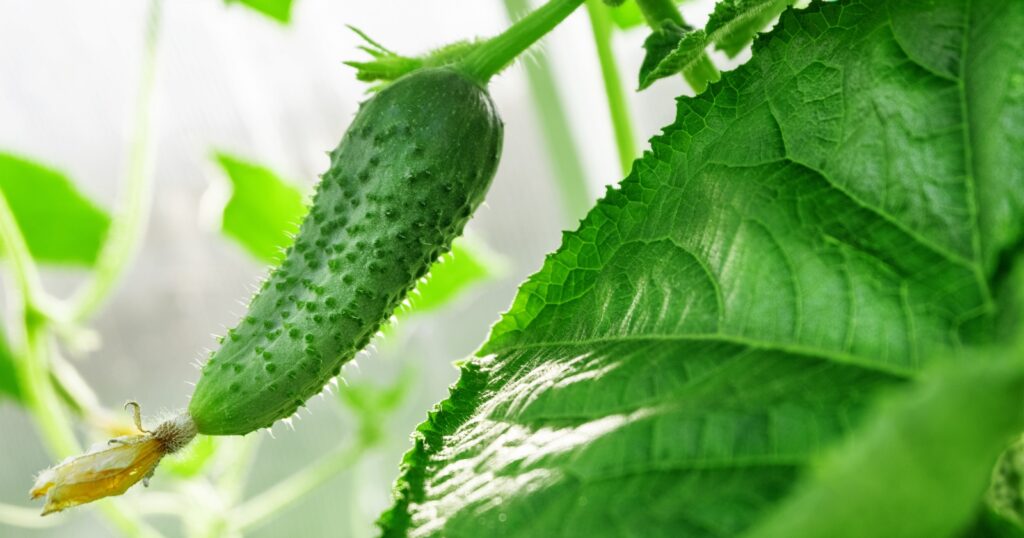
All cucumbers – both wild and cultivated – contain cucurbitacin B and cucurbitacin C. These compounds are designed to make leaves and stems taste bitter in an effort to discourage animals from munching on them. Since people don’t eat those parts of the plant, this isn’t something most of us are aware of. That all changes when the cucurbitacin compounds move into the fruit we are hoping to enjoy.
The good news is that most of the time, the entire fruit isn’t a loss. Bitterness is typically concentrated at the stem end (opposite the blossom end) and the area immediately under the skin. You can simply cut off the stem end of the fruit, peel the cucumber, and enjoy.
Bitterness Can Result From Environmental Stress
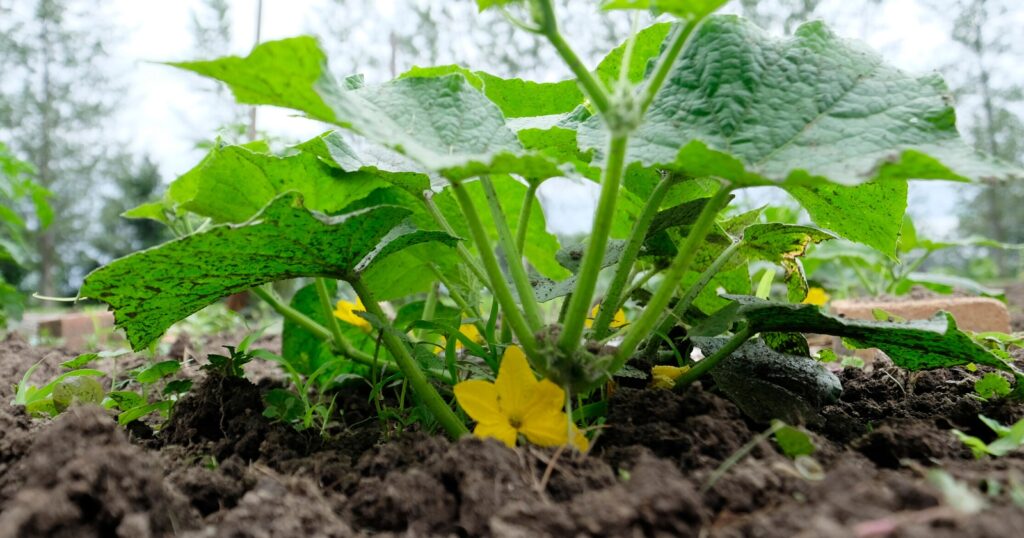
When it comes down to it, bitter cucumbers are almost always a case of a stressed out plant.
Long Periods of Hot Dry Weather
Although cucumbers are heat- and sun-loving summer veggies, too much of anything can be a problem. During periods of hot, dry weather, your cukes will experience heat stress. You can help protect your plant from this by focusing on consistent and deep watering. As a general rule of thumb, plant to give your plant about 1-2 inches of water every week.
Using a drip system or soaker hose is the ideal way to provide water to your cukes and ensure the soil and root system can absorb as much moisture as possible. Moisture retention in the soil happens when water moves through it slowly and deeply. If you quickly spray a deluge of water on the soil and walk away, most of it will run through (or out the bottom if you are using containers or raised beds) too quickly for the plant to make full use of it .
When temperatures reach anything above the mid-90s, consider adding some kind of shade cloth to provide filtered light to your plants during the hottest part of the afternoon.
Dried Out Soil
Mulch is incredibly important in the fight to protect your cucumbers from environmental stress like heat. Excessive heat and constant direct sun can quickly dry out the surface of the soil. Mulch will be your best friend in helping prevent this. By covering the soil with a 2-3” layer of mulch, you’ll help cool the surface temperature significantly and help the soil retain moisture.
You can use a lot of organic materials as mulch. Straw, grass glippings, wood chips and crushed up leaves are all things you can repurpose from your yard (if they haven’t been treated with pesticides). Alternative, you can use sustainable materials like coconut coir (my personal favorite) or any commercial mulch available at your local garden center.
Lack of Sun
On the opposite side of the weather spectrum is a lack of sun. Overcast areas – like the Pacific Northwest – have reported bitter cucumbers as a result of the plants not getting enough direct light during the day. While you can’t control the weather where you live, you can do your best to set your cucumbers up for success. Plant them in the area of your garden that receives the most sun when it’s not overcast. If it’s cool and damp, in addition to being overcast, you can try to grow your cukes in a greenhouse environment. This will allow you to keep temperatures warm and add in some grow lights if needed.
Bitterness Can Result From Avoidable Stress
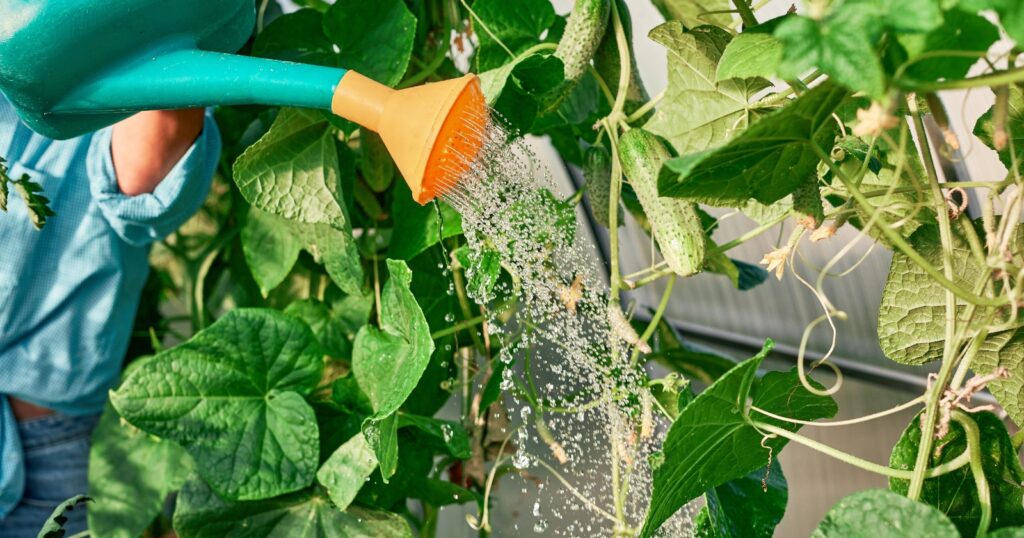
As gardners, we can’t control the weather, but we can control things like watering, fertilizing, and proper spacing in our gardens. Sometimes, stress can result from neglecting these basics, which can lead to fruit bitterness.
Uneven Watering
Cucumber fruits have a fairly high water content, so it is no wonder that the plants are pretty thirsty. As we discussed earlier, a general rule of thumb is to give your cukes about 1-2 inches of water every week. If you let the soil dry out too much in between waterings (or even forget to water sometimes…), you’ll cause the plant a considerable amount of stress. This can lead to several potential problems including the development of bitter fruit.
Water slowly and deeply. Most plants don’t like a deluge of water and cucumbers are no different. Think about the difference between taking a nice sip of water from a glass vs someone opening a fire hydrant for you. In an ideal situation, you can set up a drip system or soaker hose before planting. This will deliver water to your plants in a consistent and manageable way. If that’s not available to you, don’t worry. You can simply turn your hose on the lowest setting and just let it slowly stream into the soil. It may take a little longer than you want it to, but you’ll be happy about the end results.
You want the soil to be moist but not wet. The best way to determine if your cucumbers need water is to stick your finger in the dirt about 2-3 inches. If the soil is dry, it’s time to water. If it’s still moist, give it another day.
Water the roots, not the leaves. A common mistake with new gardeners is to water the top of the plant rather than the soil underneath. This can actually cause a lot of problems with your cucumbers including the spread of fungal disease (caused from wet soil splashing on the underside of the lower leaves), powdery mildew, leaf burn, and attracting pests.
Lack of Nutrients
Cucumbers are heavy feeders and require an organically rich, fertile, well draining soil to thrive and produce the sweetest of fruits. Nutrient awareness should start at the time of planting and continue through to your final harvest.
When planting, start with a rich, loamy outdoor potting soil and amend it with compost by gently digging it in. I make my own compost through vermiculture (worm composting), but you can also use any store-bought compost for this. Look for an organic compost with worm castings for best results.
Once your cucumber plant starts producing, they may need a nutritional boost. This can be especially true in raised beds or smaller gardens where we typically have more plants per square foot competing for the same resources.
Cucumbers need moderate nitrogen and higher levels of phosphorus and potassium to optimize fruit production. Look for an organic plant food with the first number lower than the last two (like 3-4-6). A fertilizer with too much nitrogen will result in a plant with too many leaves and not enough flowers or fruit. If it looks like your plant is struggling, feed your cucumbers with a liquid fertilizer once a month.
Proper plant spacing will also go a long way in preventing nutritional stress. Interplanting – or companion planting – is often an excellent way of growing more in a small space, but pay attention to a plant’s needs. With plenty of room to grow and available nutrients, well-spaced cucumbers tend to avoid bitterness.
Bitterness Can Be Hereditary
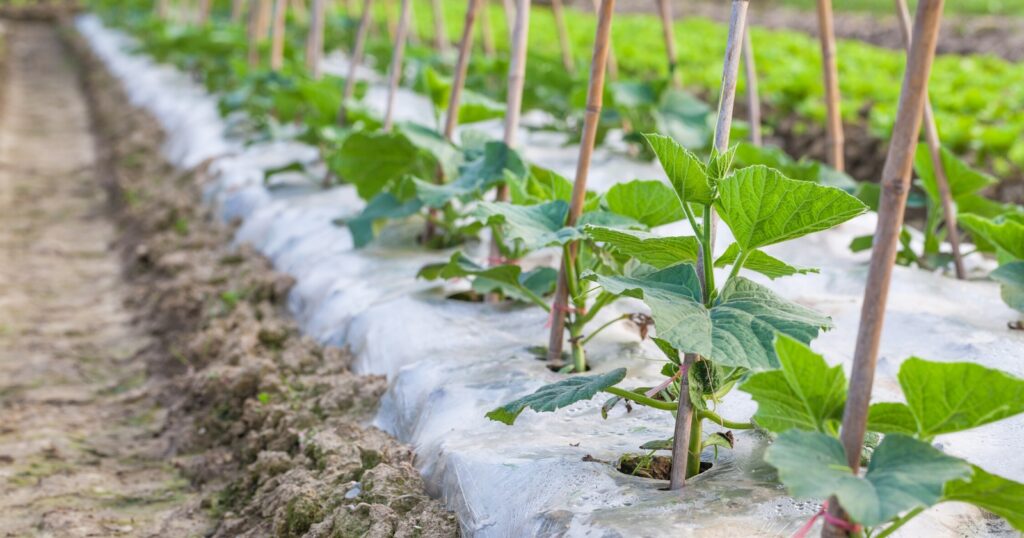
Perhaps the most frustrating reason why a cucumber is bitter is simple genetics. In some plants, there is a recessive gene that can cause a plant to produce bitter fruit right from the start – even if you’ve done a perfect job in preventing stress. So you could plant multiple seeds from the same packet, treat them all the same, and then discover that one plant produces bitter cukes.
One way to avoid this is to look for varieties that are labeled ‘non-bitter’ or ‘burpless’. Some great options to get your started are Garden Sweet (any variety with sweet in the name is probably a good bet), Marketmore 76, Lemon (a really fun heirloom), or Slice More.
Bitterness Can Be Caused By Letting Your Cukes Get Too Big
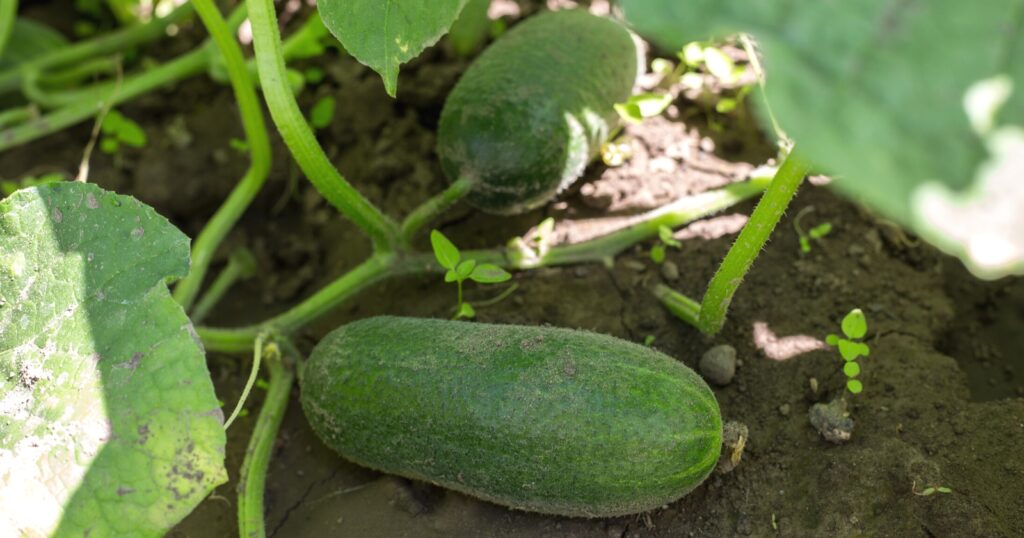
Finally, your cucumbers may be bitter because you’re letting them get too big on the vine. It’s well established that younger cukes are sweeter than those that are more mature. Try harvesting your fruit a little earlier than you normally would to see if you can avoid the bitterness.
Wrap Up
Now that we know the primary reasons behind bitter cucumber fruit, we can take steps to mitigate them. Remember that even just a few days of considerable stress can cause a ripple effect of damage. So, take steps to practice good gardening habits, mitigate environmental stresses, and choose varieties more suited toward sweetness. Happy planting!

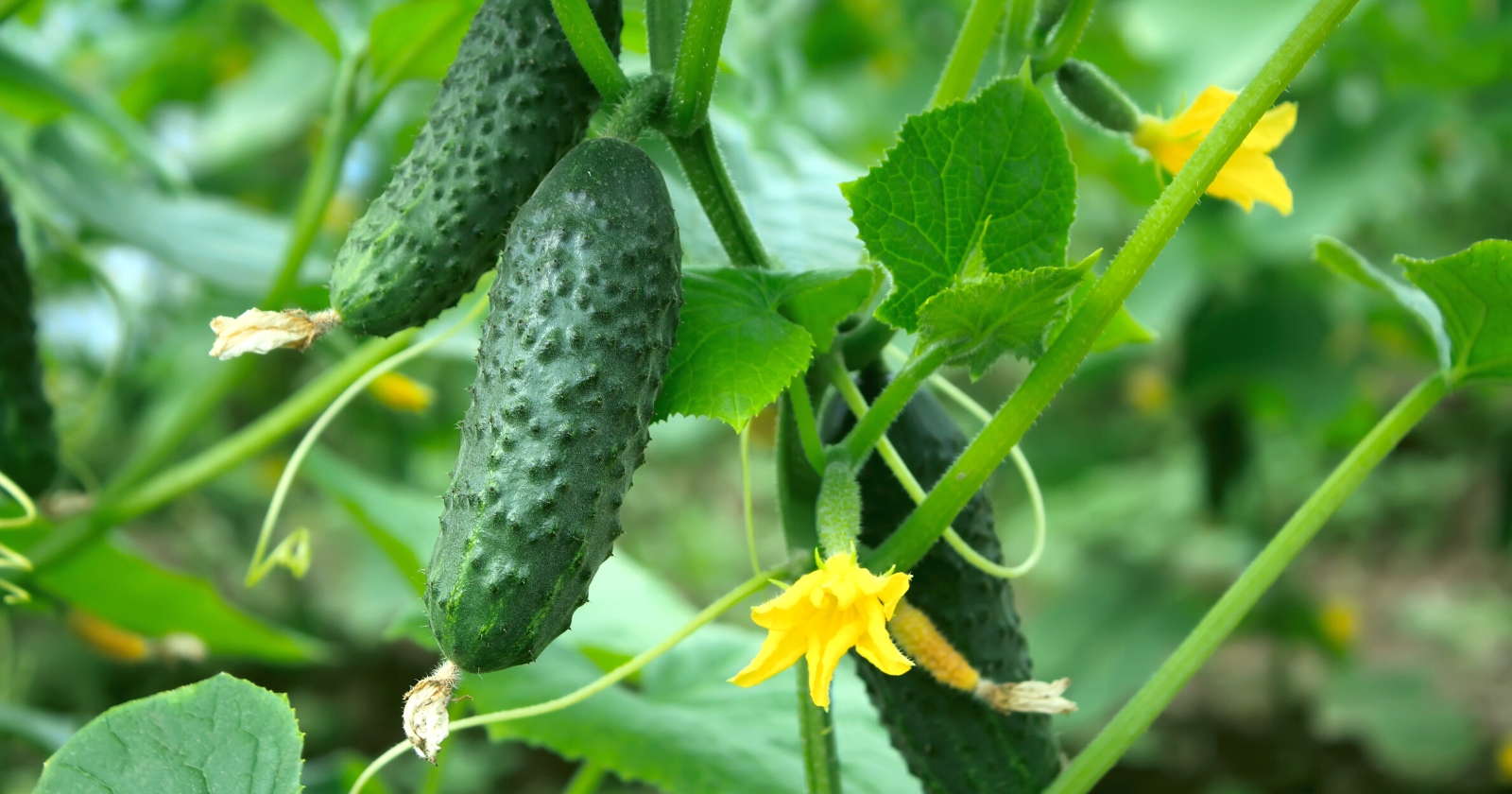
Leave a comment